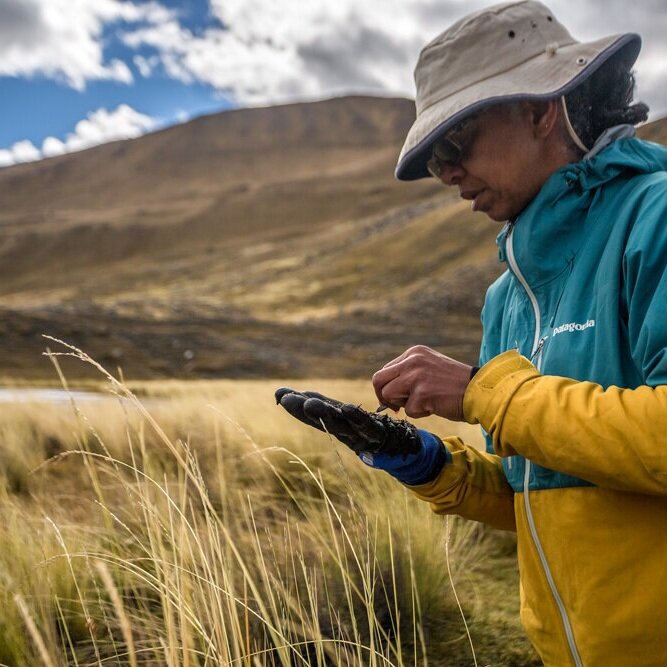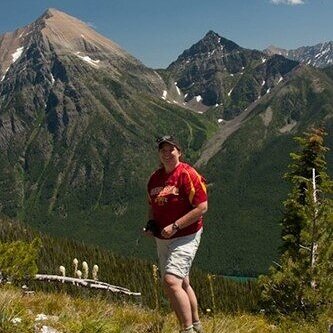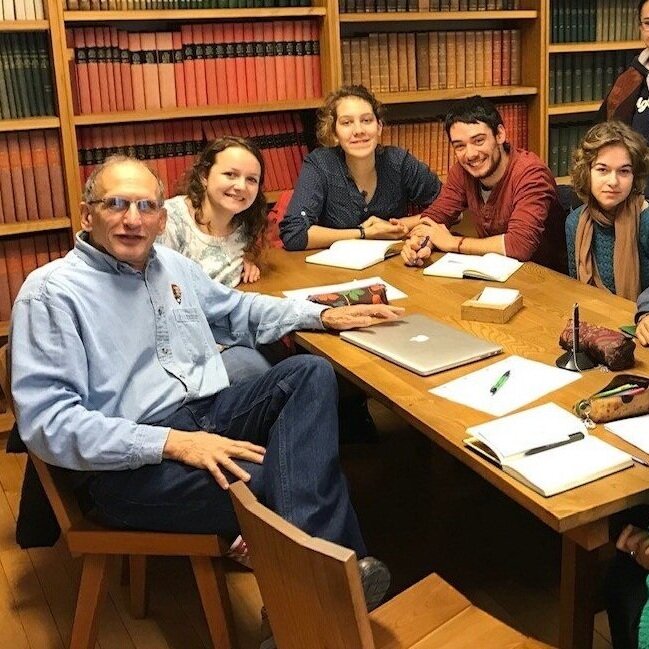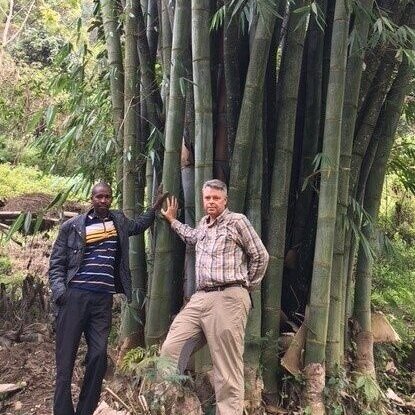Around the world, climate change is impacting every facet of life. Whether through droughts, floods, heat waves, or sea-level rise, approximately 800 million people are already vulnerable to the fallout of environmental change. To preserve our planet, we need collaboration across borders to find comprehensive and innovative solutions.
We recently spoke with four Fulbright Specialist Program alumni who are making an impact through environmental conservation efforts around the world. Through continued engagement with their host institutions, these Fulbrighters are contributing to the fight to protect the environment by advancing scientific understanding, pioneering new partnerships, and cultivating community, creating change now and for years to come.
Bamboo for Good: A Social Worker’s Approach to Sustainability and Conservation
Jonathan ScherchFounder and Director, Pacific Bamboo Resources | Contributing Faculty of Social Work at Walden University
Hosted by Makerere University – Kampala, Uganda in 2016
Throughout his career as a university professor and dean, Jonathan Scherch has been interested in the intersection of social work and sustainable development. This led him to found Pacific Bamboo Resources, a non-profit organization in Washington State that researches practical applications for bamboo. So, while serving as a Fulbright Specialist in Uganda to advise colleagues at Makerere University’s Department of Social Work and Social Administration (SWSA) on the creation of a new Master of Social Work program and improvements to their Bachelor of Social Work curriculum, he found himself connecting SWSA’s mission and activities to topics of environmental justice and sustainability.
Scherch’s conversations with faculty and students around the possibilities for using bamboo cultivation to address critical issues in Uganda like poverty alleviation, underemployment, and community welfare laid the groundwork for the Bamboo for Good (B4G) program. B4G facilitates partnerships between NGOs, governments, and private industries and provides leadership and capacity-building trainings that empower communities to use bamboo cultivation for social good and environmental conservation.
The networks Scherch created as a Fulbright Specialist have enabled him to bring B4G’s mission to life. Recently, B4G partnered with the University’s Department of Social Work and School of Forestry, Environmental, and Geographical Sciences to establish an interdisciplinary field station that will enhance students’ and community members’ understanding of bamboo cultivation methods and its applications in wildlife conservation, green transportation, and women’s and youth empowerment.
B4G now leads a unique consortium of public-private partnerships in Rwanda, Burundi, Uganda, and Kenya that have gained global recognition: the program was recognized in the Global Agenda for Social Work and Social Development as "a best practice example of innovation in social work and social development to maintain a balance between humans and the planet" and has been presented to the United Nations as a best practice model for advancing sustainable development goals.
For Scherch, his experience as a Specialist has shown him the power of collaboration across borders.
“Working together via inclusive, collaboratively designed, and carefully implemented program partnerships, we can realize social work objectives with practical, measurable, just results to meet critical social, economic, environmental, and wildlife habitat conservation goals.”
Colorado Scientist Advances Awareness of the Impact of Glacial Retreat Through Citizen Science
Gillian BowserResearch Scientist, Natural Resource Ecology Lab at Colorado State University
Hosted by National Agrarian University La Molina – Lima, Peru in 2014
When local communities and scientists collaborate through citizen science initiatives, we can all benefit from a greater understanding of the effects of climate change. As a 2014 Fulbright Specialist at the National Agrarian University La Molina in Peru, Gillian Bowser trained graduate students to measure pollinators and aquatic organisms as potential ecological indicators of climate change in nearby bofedales (wetlands found in the Andes Mountains in Peru and Chile) and worked with faculty at the University’s Rangeland Ecology and Utilization Lab to assess local communities’ perceptions of climate change.
This has helped Bowser and her colleagues examine the cause-and-effect relationship between glacial retreats, biodiversity, and the pastoral ecosystems, like cow and sheep farms, that thrive on bofedales. "You’re looking at the impact of drivers in the ecosystem on people and how it shifts people’s behavior, that in turn drives ecosystem change,” Bowser explains. In searching for tangible ways to measure the pace of glacial retreat, they chose an easily recognizable shrimp species as well as the iconic Andean bumblebee to illustrate these effects to locals and engage them in tracking environmental changes.
“Freshwater shrimp are food for wildlife, but they are also extremely sensitive to shifts in pH, so they disappear quickly as glacier water changes the chemistry of the wetlands,” says Bowser. “These [indicators] can help a community understand these longer-term changes. It's hard for people to measure pH without the proper equipment, but it's pretty easy to see shrimp.’”
Bowser examines shrimp specimens in the in the Peruvian bofedales.
Bowser is still engaged with her host institution through a National Science Foundation (NSF) grant to continue much of the work they started back in 2014. Together with colleagues at La Molina, her home institution of Colorado State University, Michigan Tech University, University of Texas at Austin, and the Mountain Institute, a Peruvian nonprofit, they continue to lead citizen science efforts to document high elevation pollinators and freshwater biodiversity changes and work with locals to collect and analyze data on changes to bofedales. Through this long-term collaboration, U.S. students at these institutions have gained new opportunities to engage in research on citizen science and ecological indicators: in 2020, the institutions hosted a virtual global conference on the effect of the COVID-19 pandemic on conservation, wildlife, and livelihoods where many students shared their work as part of the NSF partnership.
The opportunity provided by Fulbright to collaborate internationally and engage with local communities around the world has benefited Bowser’s work as an ecologist.
“It’s really rewarding to be able to work with a different community as opposed to just publish a paper. It’s a lot of fun when we’re out [in the field] together… it’s a different relationship, it’s a different way of doing research, which I think the Fulbright Program is so critical for: global understanding…. I would have never gotten here [with our current collaborations] without Fulbright.”
Strengthening U.S.-France Partnership through National Parks Internships
Jerry FreilichFormer Research Coordinator (Retired), Olympic National Park
Hosted by AgroParisTech – Paris, France in 2016
As an ecologist who has spent decades working with national parks across the United States, Jerry Freilich knows that the rangers, researchers, and directors of national and state parks are key to environmental stewardship efforts around the world. While serving as a Fulbright Specialist at AgroParisTech, an agriculture and environmental science-focused university, Freilich delivered student lectures and seminars on park science, management, and organization, and spoke to hundreds of students about opportunities to gain valuable scientific and professional experience through U.S. National Park Service (NPS) internships.
Serving as a Specialist was crucial to expanding his understanding of conservation efforts in other parts of the world. He notes, “In my experience with FSP, I think I became most aware of both the large and also the subtle differences in values between the U.S. and France. I came to realize the differences faced by conservation biologists and environmental advocates in Europe.” Freilich observed that his French colleagues stressed the long history of the agricultural challenges they face in a densely populated part of the world. “Their challenges to protect biodiversity are even greater than ours,” he explains.
Freilich (far left) speaks with some of the hundreds of French students he met during his Fulbright about opportunities to engage with the U.S. National Park Service.
Since returning to the United States, Freilich has continued to serve as a bridge between the NPS Office of International Affairs and French higher education institutions by serving as a liaison to connect French graduate students with NPS internship opportunities. These internships allow students to explore how they can apply their coursework and research to a career in park services and improve their English language skills while also benefitting the United States through engagement on NPS research projects and educational initiatives. Freilich has recently retired but continues to nurture his passion for fostering these connections by serving as a liaison for over two dozen French students to gain experience in the U.S. National Park system, from the National Park of American Samoa in the South Pacific to Crater Lake National Park in Southern Oregon.
Although the National Park System’s in-person international exchanges have been paused due to the pandemic, Freilich looks forward to resuming the strengthening of conservation ties between France and the United States. He notes that these internships benefit conservation efforts both in the United States and abroad, stating, “The National Park Service mandate—'to preserve and protect for the enjoyment of future generations’—is a top priority and vital message that we continue to convey through our engagement.
From Montana to Zurich, Using GIS and Remote Sensing in Floodplain Restoration
Diane WhitedGeographic Information Systems (GIS)/Remote Sensing Research Associate, Flathead Lake Biological Station of the University of Montana
Hosted by Zurich University of Applied Sciences – Zurich, Switzerland in 2016
In the more than twenty years that Diane Whited has worked with Geographic Information Systems GIS/Remote Sensing tools, she has seen first-hand how new technological advancements help us understand and mitigate humanity’s influence on the natural world. Whited has extensive experience using tools like drones and satellite imagery to explore and analyze river channels and floodplains, and to predict how these ecologically and economically important ecosystems might function in the face of changing climates.
As a Fulbright Specialist in 2016 Whited worked with faculty and research staff at the Zurich University of Applied Sciences (ZHAW) to better understand how Switzerland can sustainably develop its hydropower production and effectively restore river floodplains. With her expertise in aquatic and terrestrial remote sensing, Whited assisted her host in the development of drone-based monitoring techniques to quantify the impact of hydropower plants on floodplains.
Whited’s experience gave her a greater appreciation for the ways both countries use technology for scientific research and conservation. Speaking of her Fulbright program, Whited notes, “The most valuable contribution was the quality time I spent working, discussing, and brainstorming riverine research and restoration issues both in Switzerland and the United States. We spent a lot of time discussing how we can use technology to help monitor and track restoration success over time.”
The experience also had a profound personal impact on Whited, affecting the way she advocates for herself and her work today. “I am a tried-and-true introvert, so being in a foreign country forced me to interact with the general public, students, and fellow colleagues more than ever. I also gained confidence in promoting my work and myself. As the sole representative for my university [in Zurich], I felt that I was the key person in continuing our collaboration for future endeavors between our institutions,” Whited explains.
Following her project in 2016, Whited continues to engage with colleagues in Switzerland by exchanging knowledge about practical applications of technology in conservation. While working together, she and her hosts recognized a need for students studying environmental issues to learn more about the skills, tools, and applications for using drones in environmental monitoring. As a result, Whited and one of her Swiss colleagues, Professor Michael Doering, developed a two-week intensive field course for University of Montana students and a 10-week equivalent course to be taught at ZHAW, with Whited and Doering visiting each other’s institutions during the summer to assist with coursework. This past year has looked a bit different due to the COVID-19 pandemic – Whited instead recorded lectures and reviewed students’ research proposals remotely – but she hopes to build upon these joint courses to establish a formal student exchange program once the pandemic subsides.








